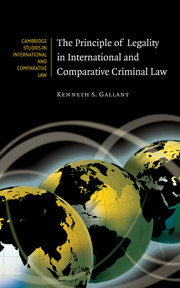Book contents
- Frontmatter
- Contents
- Explanatory Note on Spelling
- Acknowledgments
- Introduction
- 1 Legality in Criminal Law, Its Purposes, and Its Competitors
- 2 A Partial History to World War II
- 3 Nuremberg, Tokyo, and Other Postwar Cases
- 4 Modern Development of International Human Rights Law: Practice Involving Multilateral Treaties and the Universal Declaration of Human Rights
- 5 Modern Comparative Law Development: National Provisions Concerning Legality
- 6 Legality in the Modern International and Internationalized Criminal Courts and in the UN Trust Territories
- 7 Legality in Customary International Law Today
- Conclusion: The Endurance of Legality in National and International Criminal Law
- Appendix A Chart of Non-retroactivity Provisions in Criminal Law by Nations
- Appendix B Legality and Non-retroactivity Provisions as of 1946–47
- Appendix C Constitutional and Other National Provisions Implementing the Principle of Legality Today
- Bibliography
- Table of Authorities
- Index
- Afterword and Update
- CAMBRIDGE STUDIES IN INTERNATIONAL AND COMPARATIVE LAW
- References
4 - Modern Development of International Human Rights Law: Practice Involving Multilateral Treaties and the Universal Declaration of Human Rights
Published online by Cambridge University Press: 04 July 2009
- Frontmatter
- Contents
- Explanatory Note on Spelling
- Acknowledgments
- Introduction
- 1 Legality in Criminal Law, Its Purposes, and Its Competitors
- 2 A Partial History to World War II
- 3 Nuremberg, Tokyo, and Other Postwar Cases
- 4 Modern Development of International Human Rights Law: Practice Involving Multilateral Treaties and the Universal Declaration of Human Rights
- 5 Modern Comparative Law Development: National Provisions Concerning Legality
- 6 Legality in the Modern International and Internationalized Criminal Courts and in the UN Trust Territories
- 7 Legality in Customary International Law Today
- Conclusion: The Endurance of Legality in National and International Criminal Law
- Appendix A Chart of Non-retroactivity Provisions in Criminal Law by Nations
- Appendix B Legality and Non-retroactivity Provisions as of 1946–47
- Appendix C Constitutional and Other National Provisions Implementing the Principle of Legality Today
- Bibliography
- Table of Authorities
- Index
- Afterword and Update
- CAMBRIDGE STUDIES IN INTERNATIONAL AND COMPARATIVE LAW
- References
Summary
The revulsion against the Nazis' rejection of legality, questions about the true application of the principle of legality in the Nuremberg prosecutions, and other factors driving the international human rights movement led to the principle of legality becoming an international human right. The rest of this book is largely concerned with how this happened between World War II and the present and the current status of customary international law concerning legality. This chapter considers the treaty law and other international acts of states concerning legality and non-retroactivity of criminal law. Later chapters will consider the internal and comparative law of legality in modern states, legality in the modern international and internationalized criminal tribunals, and the current status of legality in customary international law.
The emphasis on legality after the war was driven at least in part by a sense of guilt (or perhaps shame) that Nuremberg and Tokyo might have involved violations of legality, specifically concerning the creation of the crime of aggression, and, to a lesser extent, crimes against humanity. Moreover, many hoped to turn the same prosecutions into a onetime set of events that – even if problematic in themselves – would create a solid foundation of law to support later prosecutions for war crimes, crimes against humanity, and crimes against peace.
Perhaps this was best summed up in a remark by René Cassin, of France, in the negotiations that led to the International Covenant on Civil and Political Rights.
- Type
- Chapter
- Information
- Publisher: Cambridge University PressPrint publication year: 2008



